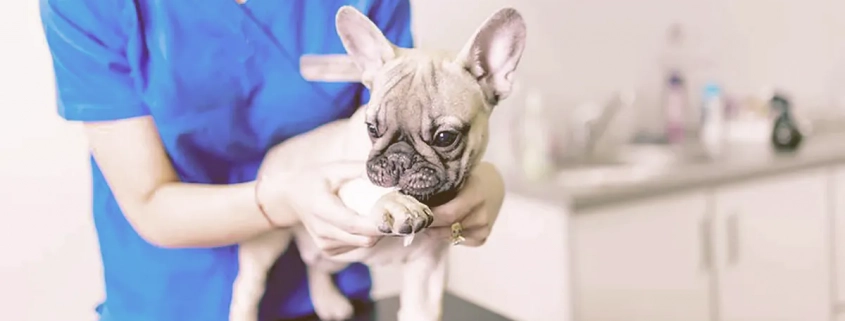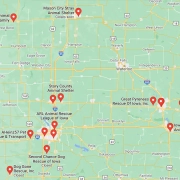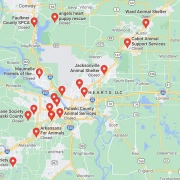French Bulldog Medical Issues: Everything You Need to Know
Alex Vicente • Updated on August 1, 2023
- This review contains affiliate links. Read more here.
- Not a substitute for professional veterinary help.
If you’re the proud owner of a Frenchie, you know how playful, charming, clever, and adaptable they are.
Unfortunately, due to their genetic make-up as a short-nosed, brachycephalic breed, French Bulldogs suffer many serious health problems. Sadly, these problems often start as early as the age of two and persist throughout their lifespan of 10–14 years.
Their various health issues affect their quality of life and result in major veterinary expenses.
If you have a French Bulldog or are looking into adopting one, it’s important to know the health challenges they face and be prepared to deal with them. Read on for a thorough overview of French Bulldog medical issues.
Table of Contents
8 Common French Bulldog Medical Issues
As a Frenchie owner, you should be aware of the following common health problems and watchful of their tell-tale signs to give your French Bulldog the best chance at a long, healthy, and happy life.
1 – Breathing Problems

A French Bulldog is very vulnerable to Upper Respiratory Infections. This condition will usually affect every French Bulldog at least once in his lifetime. It’s highly contagious, so it can easily be transmitted among dogs.
Every French Bulldog also suffers some degree of Brachycephalic Obstructive Airway Syndrome (BOAS) due to the flat face, narrow nostrils, and short snout, which cause windpipe obstruction.
Look Out For:
- Nasal congestion, discharge.
- Coughing, sneezing, watery eyes.
- Lethargy.
- Appetite loss.
What to Do:
- Keep your Frenchie at a healthy weight to minimize the effects of respiratory problems.
2 – Ear Problems

French Bulldogs are frequent sufferers of painful middle ear inflammations and ear infections (Otitis externa). This is due to their very narrow ear canals, which they can’t naturally clean, making them warm and wet.
These infections can cause rupturing of the eardrum and hearing loss in severe cases. Also, French Bulldogs may be born deaf or become deaf at an older age.
Look Out For:
- Excessive ear scratching or head shaking.
- Redness inside the ear, swelling, or waxy discharge.
What to Do:
- Always keep your Frenchie’s ears clean and dry.
3 – Allergies

All dog breeds are susceptible to allergies; French Bulldogs are even more so. Genetics increases the risk of your Frenchie developing an allergy, but he can also develop a food, seasonal, drug, or environmental allergy at any time.
Look Out For:
- Itching, paw licking.
- Red/raw skin or paws.
- Watery eyes, ear infections, or sneezing.
- Diarrhea, bloody or foul-smelling stools, vomiting, abdominal pain, weight loss, appetite loss, or lethargy.
What to Do:
- Seek vet advice to identify the allergen.
- Manage the allergy through medication, or by adapting your dog’s diet and environment to his needs.
4 – Gastrointestinal Problems

Almost 2% of French Bulldogs suffer gastroenteritis, and almost 7.5% suffer diarrhea. Frenchies are very sensitive to parasites, viruses, and e-coli, which cause diarrhea, gastroenteritis, and colitis—an inflammation of the large intestine or colon.
Look Out For:
- Runny, tarry, foul-smelling, or bloody stools.
- Weight loss, appetite loss.
- Vomiting, bloody vomit.
- Dehydration, fever, nausea.
- Depression, lethargy.
What to Do:
- Help prevent or treat gastroenteritis by giving your Frenchie fresh water and decreasing their food intake. Seek your vet’s help if the problems persist.
5 – Eye Problems

Conjunctivitis (pinkeye) and corneal ulcers are usually caused by bacterial and viral infections, allergies, dry eye, or blocked ducts. Pinkeye occurs in over 3% of French Bulldogs. Their large eyes make them more prone to scratches and ulcers.
While most cases will need antibiotics to treat, more severe cases may require surgery.
Cherry eye is one more painful eye disease that’s also common among French Bulldogs.
Look Out For:
- Pink/red eyes, swollen eyes.
- Excessive blinking, squinting, pawing at the eyes.
- Mucus, pus discharge in the eyes.
What to Do:
- Keep your Frenchie’s eyes clean and prevent irritants, like sand, from getting into them.
- Treat his eye issues promptly to avoid complications or even vision loss.
6 – Skin Problems

Your French Bulldog’s folded skin around his muzzle, nose, neck, armpits, and crotch, can lead to skin fold dermatitis. Pyoderma is also a skin bacterial infection that happens when a cut or scratch gets infected.
Look Out For:
- Itching, biting, and scratching.
- Redness, crusts, welts, and sores.
What to Do:
- Keep your Frenchie’s skin folds dry and clean to help prevent dermatitis.
- Prevent pyoderma by keeping your dog’s skin clean, especially when he’s wounded.
- Avoid walking your dog in muddy areas; clean his paws and skin folds after wet and muddy play. This will also help prevent a disease called Alabama rot that can damage his kidneys and circulatory system.
7 – Mobility Problems

French Bulldogs can develop several mobility issues, including Intervertebral Disc Disease. Their short stocky legs genetically predispose them to IVDD, a condition where the discs between the vertebrae bulge into the spinal cord space, causing pain and nerve damage.
Hip Dysplasia is another genetic condition French Bulldogs are prone to, leading to joint deterioration.
Look Out For:
- Paw dragging, reluctance to move, or pain while walking.
- Discomfort when touched or handled.
- Loss of bladder/bowel control.
- Sudden paralysis.
- Difficulty walking on hind legs.
What to Do:
- Keep your Frenchie at a healthy weight. Avoid overfeeding him as a puppy and help him maintain a healthy diet to prevent or slow the progression of hip dysplasia.
- Avoid over-exercising your Frenchie.
- Prevent him from jumping too much to slow the progression of IVDD.
8 – Heat Stroke
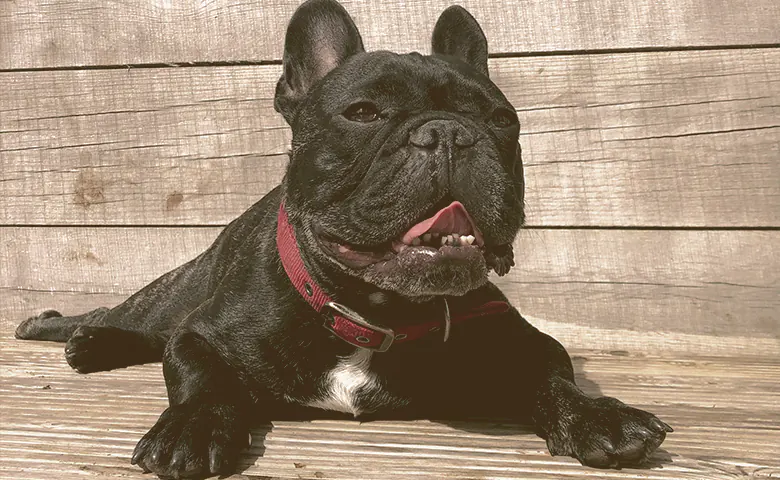
A French Bulldog has difficulty regulating his body temperature and is twice as likely to suffer from heatstroke.
Look Out For:
- Excessive panting, drooling.
- Difficulty breathing, rapid heart rate.
- Lack of coordination, lethargy.
- Blue or bright red gums, glazed eyes.
- Vomiting, diarrhea, convulsions, fever.
What to Do:
- In hot or humid weather, keep your Frenchie in a cool space to avoid overheating.
- If your Frenchie shows signs of heat stress, move him quickly to a cooler area; run cool water over the back of his head and neck. Massage his legs to help his circulation and reduce the risk of shock, and let him drink a lot of water. Get vet assistance for heatstroke as soon as possible.
In a Nutshell
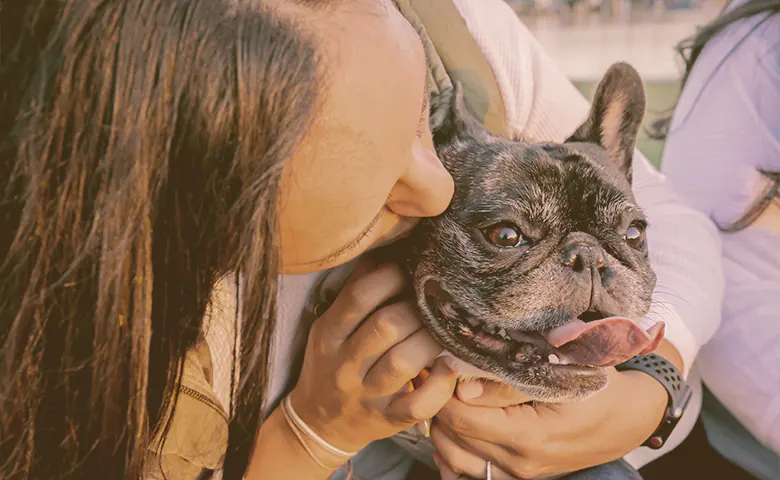
Sadly, French Bulldogs’ medical issues are numerous. They’re notorious for their long list of genetic health problems due to being purebreds.
By being aware of the common health problems that face this lovable breed and how to promptly deal with them, you can help your pet live as healthy as possible.

